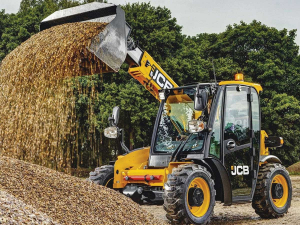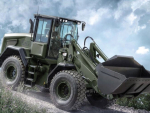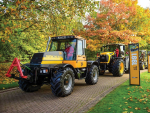The last decade has seen telehandlers becoming more and more popular on New Zealand farms for their performance and versatility.
Over that time manufacturers have chased higher lift capacities and greater lift and reach, but more recently smaller compact units have found increasing favour, not least for their manoeuvrability in yards and around buildings.
Always showing high in the telehandler charts with its Loadall range, JCB has released details of its smallest machine yet. The Loadall 514.40 has key dimensions of only 1.8m high and 1.56m wide, yet still lays claim to being the largest cab in its class.
On the performance side the machine offers a maximum lift capacity of 1,400kg to a maximum lift height of 4 metres, while importantly offering 525kg lift capacity at maximum reach of 2,510mm. This means it will lend itself to those looking to work in tight spaces, with regards to performance and manoeuvrability, but also to those operators looking for portability.
This last area is helped by a tare weight of 2,695kg, meaning it should be capable of being towed by a ute with a towing capacity of 3,500kg, obviously with a suitable trailer.
The powerplant is a 3-cylinder 1,100cc Perkins delivering 24.7hp and 70NM, complying with Stage V emission regulations without the need for a Diesel Particulate Filter (DPF) or Diesel Exhaust Fluid (DEF). The units are said to offer a 17% increase in power to weight ratio over the previous generation 516.60.
The driveline incorporates a Bosch hydrostatic transmission, with a two-speed Linde motor driving all four wheels, with a maximum speed of 15km/h and four-wheel steering is standard for operating in tight environs.
Offering a cabin said to be up to 200mm wider that its competitors and 20% larger than the previous 514.60, the company also notes that around 82% of the machine components are shared with other JCB models, meaning important areas such as ease of maintenance, maximum parts availability and reduced downtime are well covered.
Standard equipment includes a towbar and electrical connection, road lighting, reversing alarm, JCB Load Control and JCB Lie telematics. Optional extras include an LED lighting package, beacons and a JCB immobiliser keypad.


















